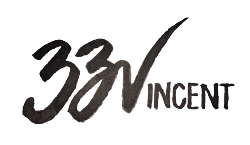The 20 Most Essential Executive Assistant Skills in 2021
Being an Executive Assistant often means wearing multiple hats every day. As an executive’s right hand, this high-powered job requires a rare combination of soft and hard skills which can only be developed through time, experience, and a heap of determination.
However, this strategic, multifaceted role is often confused with other roles such as Administrative Assistant or Executive Secretary—but we believe the Executive Assistant role is uniquely different from these roles, and can have a huge impact on an organization and executive team! The Harvard Business Review even recently said a top-notch Executive Assistant “is crucial to being productive.”
So what does it take to succeed in this demanding profession?
Maybe you’re an EA looking to learn new skills, or an executive yourself wondering what the hubbub is all about. Below are the 20 top skills we look for at 33Vincent, where world-class Executive Assistants are the cornerstone of our business.
1. The Ability to Manage Up
At its core, “managing up” means protecting an executive’s time and focus. In today’s fast-paced work environment, there are many things competing for a business leader’s attention. An Executive Assistant adept at managing up will know how to strategically coordinate schedules, projects, meetings, and act as a gatekeeper for their time—ensuring their executive can focus on their highest leverage work. At times, it can even mean acting as a manager for the executive themselves.
A good Executive Assistant will do their research and present their executive with several choices. A great Executive Assistant adept at managing up will instead know their preferences and will have made those choices ahead of time, ensuring the executive’s lift is as minimal as possible (simply approving their EA’s recommendation).
This concept can apply to many of the following skills. With managing up simple email, meeting, or calendar management becomes an entirely different tool that can boost productivity past simply getting more done!
2. Email Management
Studies have shown that employees use up to 6+ hours a week solely reading and responding to emails, and that wasted time can be even higher for executives! By maintaining a clean inbox for your executive, you’ll instantly save them dozens of hours per month.
Great email management skills are a small part of a much larger job, and maintaining your client’s inbox quickly so you don’t waste time yourself can be a surprisingly difficult task. It’s a must-have skill for Executive Assistants.
Hitting daily inbox zero can be much trickier than it sounds—Check out our full inbox management guide here!
3. Calendar Management
With a busy schedule, maintaining a well-functioning calendar can be like playing a 4D game of Tetris. It just never ends! But getting everything scheduled is only one small part of proper calendar management. By managing up, the simple calendar can become a productivity powerhouse.
We recommend learning advanced scheduling strategies such as:
Scheduling your client’s most important tasks for when they’re most alert
Aligning calendar items to your clients’ top priorities
Streamlining meetings down into only the essentials, and batching team requests
Using the schedule as a form of gatekeeping to keep distractions at bay
Utilizing the calendar to help keep your executive on-task
4. Travel Management
Often the Executive Assistant needs to take on the role of an entire travel agency, booking flights, hotels, rental cars, and more. This is another great area where managing up comes in really handy.
It’s easy to simply hand a business leader a list of flights and hotels for them to choose from, but a great Executive Assistant will take it to the next level by learning their preferences and proactively recommending a complete itinerary.
One of our Executive Assistants recently had to deal with a medical emergency while their executive was traveling. Thanks to her fantastic planning and travel management skills, the executive knew exactly what hospitals nearby accepted her insurance, saving potentially tens of thousands of dollars—and maybe even their life!
Here’s our full guide to Executive Travel Management.
5. Meeting Management
Another important skill is being able to properly plan and manage meetings. So many unnecessary meetings happen in the workplace it’s become a meme. How many times have you heard “This meeting could have been an email?”
Meetings can often start late, meander around topics, and end up feeling pointless. But, through effectively gatekeeping against unnecessary meetings and ensuring meetings are properly planned, this is another great way Executive Assistants save their client’s precious time. Our best tips for success are:
Ensure every meeting has a clear purpose, and all attendees are aware of the ideal meeting outcome.
With the exception of brainstorming or personal catchup times, meetings should have clear agendas and a clear owner who will ensure all topics get covered.
Meetings should always start and end on time. If an attendee is late, they’ll learn for next time! And if certain attendees are taking up more talk time than they should, great EAs know how to corral the conversation back and tee up quieter contributors for success. And if they aren’t in the room, a good EA will help support their executive in doing the above.
Check out our top 5 Steps Toward More Effective Meetings here.
6. Project Management
Executive Assistants are often already experts at project management, even if they don’t know it yet. That’s because at its core, project management is simply breaking larger, complex goals down into smaller ones, and ensuring that everything (and everyone) stays organized and on track to meet it—and most Executive Assistants already do that every day!
Great EAs often excel at project management, streamlining both the tactical work as well as the communication of the teams involved. This cuts back on the amount of time an executive would normally spend ensuring everyone is on task, answering questions, and often tidying up loose ends and details themselves.
Project management apps were also one of the most frequently mentioned tools when we surveyed our community for our “7 Great Digital Tools Every Executive Assistant Should Use” article.
7. CRM Management
Most companies use a Customer Relationship Management (CRM) tool like Salesforce, Dynamics 365, Zoho, HubSpot, or Adobe Marketing Cloud to manage their customer relationships. These tools are extremely useful and managing them is important work, so they can often be a large timesink for business leaders.
Because of this, many top Executive Assistants are familiar with these systems, even going as far as to become certified in their use. The good news is that these databases and tools are often very similar to one another, so if you’re familiar with one it greatly speeds up the time it takes to become familiar with a new CRM system.
If managing professional relationships and networking is a big pain point for executive, consider getting more involved with their companies CRM to discover if it can be leveraged to help your executive remember key contacts and their info.
8. Systems and Process Management
Another area highly skilled Executive Assistants excel at is creating SOPs and managing various systems and processes. But what does that really mean?
An SOP is a Standard Operating Procedure–it helps teams and companies consistently deliver high quality results in areas that recur often (like invoicing, customer service conversations, reimbursements, and more.) You can create an SOP for nearly anything, from creating a post on social media to writing blogs or managing an entire project. Process management is the overall ability to align these SOPs with an organization's strategic goals, measure them, and find areas where they could be tightened up to save time.
Experienced Executive Assistants have likely seen a large number of various systems and processes, so they’re familiar with the areas that could be improved upon and the latest digital tools that can help save time.
9. Event Planning
At some point or another, every EA needs to plan an event. Whether it's a small board meeting to a larger company retreat, event planning is an essential executive assistant skill. From managing the caterers to booking the entertainment, event planning can also be one of the more enjoyable duties of an EA.
Many companies simply don’t have the resources to hire a full time event planner, and in this case an experienced Executive Assistant can prove invaluable. When planning an event, the devil is always in the details, and the details is where Executive Assistants live!
Check out our guide to Event Planning here!
10. Written Communication
This is another hard skill that is essential to being an effective EA. So much of an EA’s work is written:from travel itineraries to event programs to responding to emails effectively when ghost-writing as your executive, having top-notch writing skills is an absolute must!
Consider these best practices to improve your written communication:
Always double check your deliverables. If it’s something really important (like a board report), consider printing it out and checking it by hand, instead of on a computer.
Read your work out loud. We’ve found this helps us catch errors we wouldn’t normally see when scanning the text.
Have someone else check your work. If you’re trying to review a longer piece, have a trusted coworker scan it as well.
11. Emotional Intelligence
Kicking off our soft skills category is emotional intelligence. This is a huge area for an EA, as it’s important to understand and intuit how your client is feeling during certain situations. Paying attention to your executive’s needs is crucial for understanding how you can make their work easier—and more effective.
Often, the business leader themself won’t notice how much something bothers them. For instance, a dedicated EA with high emotional intelligence might notice that an executive is always in a foul mood when they need to take a meeting after lunch. That is a prime example of a nonverbal cue the Executive Assistant should note down, and try to give their client some breathing room after lunch before they have another meeting.
Emotional intelligence isn’t all about paying attention to your executive though; it also means being able to effectively communicate with them (and others) as well. A large part of an EA’s job is to ensure that their executive is staying on-task—and there is definitely a right way and a wrong way to prod your clients to stay focused!
Likewise, when managing teams or outgoing communication from an executive, emotional intelligence is also key in making sure everyone feels understood and heard. Happy employees are up to 30% more productive, and having the emotional intelligence to communicate effectively is a large part of that!
12. Strategic Thinking
This is definitely a skill that is much harder to teach than others, but comes in incredibly handy as an Executive Assistant. Proactively considering how a decision or process will affect the whole organization is an absolute necessity when working as an EA.
A seasoned Executive Assistant will be able to understand intuitively how to analyze critical factors that will influence the long-term success of an organization. Like so much else as an EA, the key to strategic thinking is in the details and how they relate to the large whole.
It would take a whole article to explain how to think strategically, so here’s an example of strategic thinking written by a Ph.D.!
13. Proactivity & Anticipating Needs
Similar to how the imaginary EA in #11 recognized their client hated taking meetings directly after lunch, being proactive and anticipating client needs is another key skill in becoming a truly effective Executive Assistant.
Whether it’s noting your clients preferences around meetings or looking up local hospitals that take their insurance before a big business trip, thinking proactively and anticipating your client’s needs makes their life and work easier—and that’s the name of the game!
Sadly, this isn’t a skill that can be easily taught. But a good guide can go a long way, so be sure to read our other articles and keep a look out for our upcoming resources on this topic!
14. Composure Under Pressure
The deadline for a major project is in a few hours and one team is coming up short. Your executive is away on business travel... and now someone’s accidentally deleted 5,000 contacts in the company CRM.
QUICK—What do you do?
These pressures happen to EAs on a daily basis, and working well under crunchtime is another essential part of the executive assistant skillset. Thankfully, this is where most EAs shine the brightest!
15. Tech Savvy
It goes without saying that being technologically fluent is a major part of being an EA. So much of what an executive assistant does is made easier through the use of technology, and there’s always another new app or tool to make the work even easier.
In addition, most of the platforms used to manage business today are digital, whether it’s a calendar or email or a project. So being able to troubleshoot the technical side of things is and will always be incredibly important! We recommend befriending your company’s IT department–establishing a good relationship with them from the outset will give you an ally when software fails or your exec needs a tool to work creatively.
We mentioned it before, but it’s worth mentioning again: We polled our community to create this list of 7 Great Digital Tools our Executive Assistants use every day. Also check out our 10 Favorite Apps as a Totally Remote Organization!
16. Organization Skills
Color-coded calendars. Tidy email folders. Pristine spreadsheets. These are a few of our favorite things!
No, but seriously, no EA can function well without a great innate sense of organization. It trickles down into many different realms of EA work, and is absolutely essential—especially when working with multiple executives.
Thankfully there are now loads of software to help keep things organized for you! Base is a fantastic software our Executive Assistants use, and was specifically built for EAs. Their “Dossier” functionality is especially handy when it comes to organizing multiple clients.
17. Professional Discretion
When working so closely with an executive, every EA eventually runs into confidential information.
Whether it’s personal information of employees or trade secrets, professional discretion is an absolute must-have. There really isn’t much room for gossiping when it comes to being an Executive Assistant.
Practice discretion both within your company and externally, and you’ll build trust with your executive for the long haul.
18. Smart Multitasking
As an Executive Assistant, there are always multiple irons in the fire. The ability to quickly prioritize which needs the most attention first not only helps an EA be more efficient in their work, it also makes the work easier for them too in the long run.
It’s also worth noting that while multitasking is important, sometimes it’s not the best way to approach a bundle of duties.
At 33Vincent, we’re also big fans of “The One Thing” principle: that you should focus on your highest leverage task first. This is especially important for executives, but can also be helpful for their assistants as well. Encourage your executive to focus on the important, strategic essentials of their work.
19. Gatekeeping and Negotiating Skills
As an Executive Assistant, your job is to find creative ways to get what your executive needs done, in the most efficient way possible. EAs are miracle workers in this regard–but it can take from negotiating and diplomacy skills.
For example: You help manage the Asana project management board for your executive’s leadership team, including assigning individual pieces of a long-term project to its corresponding contributors. One Director strongly disagrees with the direction of the project, but after much discussion, your exec is sticking to the original plan. It’s your job to help make sure this Director stays on schedule and delivers his team’s contribution so that the project succeeds. Enter: you, with a heap of diplomacy and kindness!
Another strong component of being an executive assistant is gatekeeping your client’s time. After all, saving executives’ time is why the profession exists! Being able to effectively protect your client’s schedule—sometimes from the executive themselves—is almost like a fine art.
20. General Resourcefulness
And now, as we’re reaching the end of this large list, we have perhaps the most broad but important skill. Resourcefulness.
Chances are if you’re an Executive Assistant and you have even half of the skills listed here, you’re pretty darn resourceful. And that’s a good thing, because the best EAs absolutely excel at resourcefulness.
I know a particularly resourceful EA that was once tasked with creating a website—something well outside of the standard EA job description. With minimal coding experience but a lot of tenacity and resourcefulness, she was still able to complete the task—and it looked pretty good too!
The best EAs bring a “I can do this” mentality to their work, and are confident in their ability to make it happen. And if they can’t, they proactively recommend an alternative solution that still results in success for themselves, and their executive.
Next Steps
An executive assistant will live in the details and collaborate with you to elevate your focus and enhance your productivity. If you’re interested in finding out how an executive assistant can support you, click the button below and a member of our team will be in touch!
33Vincent has many other resources to help you maximize your time and communication with your executive assistant.





















